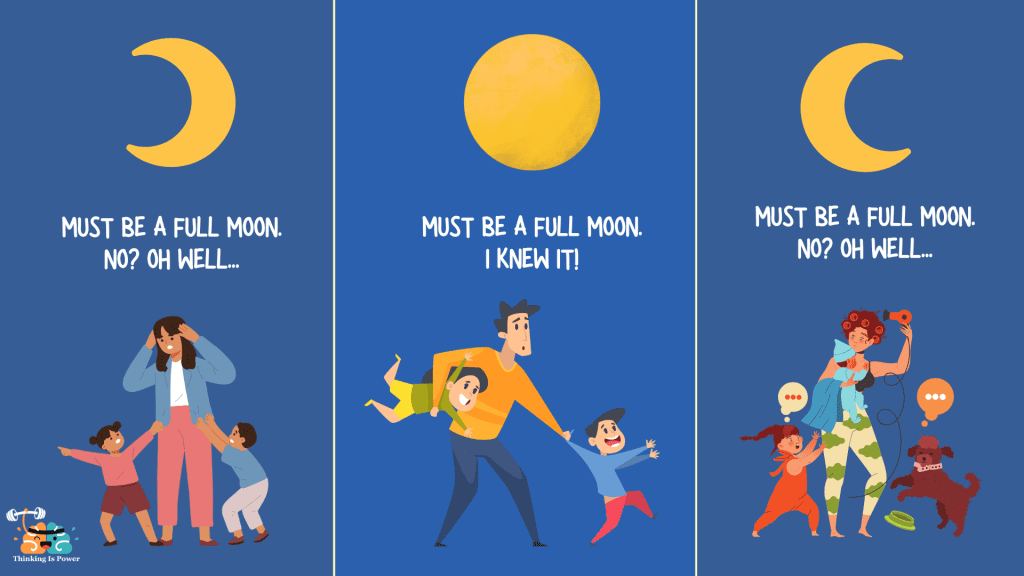A very common (but mistaken) belief is that a full moon impacts human behavior. Indeed, the full moon is often blamed by nurses and doctors for an increase in hospital admissions, police for an increase in crime, and educators and parents for kids’ rowdy behavior.
(It’s fun to note that the root of the words lunacy and lunatic come from the Latin luna for moon.)
However, there is no good evidence that the moon has any of these impacts. Really. Decades of research simply do not support the full moon effect.
(Unsurprisingly, some studies have found slight correlations between the full moon and various physiological effects and human behaviors. But importantly, the correlations tend to disappear with better controlling and study designs.)
Why does this belief persist? Blame our irrational brain.
We have believing brains: while we like to imagine ourselves logically following evidence to a conclusion, we generally form beliefs first then search for supporting evidence. In this case, somewhere along the way we heard the moon causes us to act strangely and we believed it. After all, it seems like it could be true: gravity from the moon does cause tides, for example. But the oceans are huge! There’s no effect on smaller bodies of water, such as lakes, streams, glasses of water… and our brains. Additionally, the new moon’s gravitational pull is just as strong, but isn’t blamed for wild behaviors.
Now imagine a teacher who believes in the full moon effect. He notices his students seem to be a little rambunctious and thinks, “It must be a full moon.” If it is a full moon, he confirms – and probably becomes even more confident in – his belief. If it’s not a full moon, he quickly interprets their behavior differently or blames it on something else. And in the future, he’s much more likely to remember the examples that supported his belief and forget the others.
The same for some police and medical personnel, who believe (falsely) believe the full moon increases crimes or visits to the ER (respectively).
In short, we continue to support this false belief through irrational thinking. We believe what people around us believe, we notice correlations and assume causation (false cause fallacy), and we search for and remember the instances that confirm our belief (confirmation bias).
The take-home message
Despite the lack of evidence, the full moon effect is widely believed. Yet while personal experiences may feel compelling, anecdotes aren’t sufficient evidence. The bottom line is that we are easily fooled and that science can help us correct for our biases.
Learn more
Much ado about the full moon: A meta-analysis of lunar-lunacy research
Why do we still believe in ‘lunacy’ during a full moon
Lunacy and the full moon: Does a full moon really trigger strange behavior?
The moon was full and nothing happened: A review of studies on the moon and human behavior and lunar beliefs
Is it the moon? Effects of the lunar cycle on psychiatric admissions, discharges and length of stay
The power of the full moon: Running on empty?
Does the moon affect menstrual cycles?
Are children like werewolves? Full moon and its association with sleep and activity behaviors in an international sample of children
No evidence of purported lunar effect on hospital admission rates or birth rates
